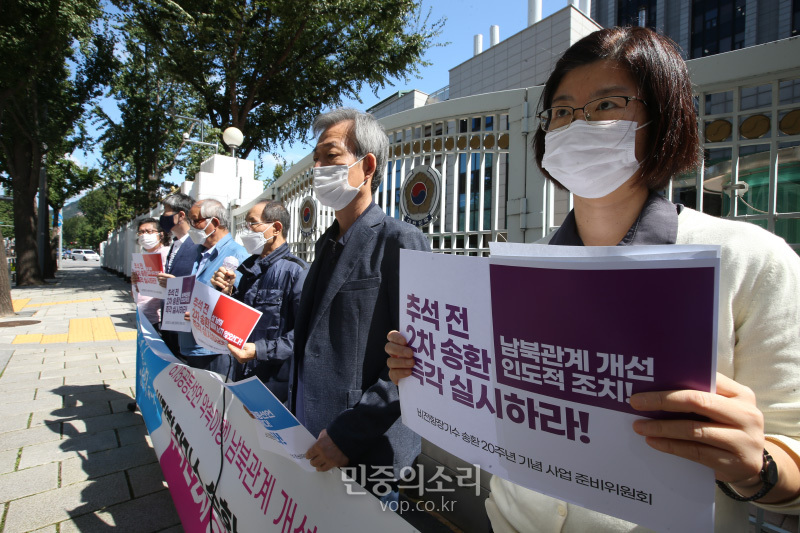More languages
More actions

Unconverted long-term prisoners is a term which refers to political prisoners imprisoned in south Korea, generally on charges of "anti-state" activities or views in support of communism or DPRK.[2][3] The term commonly refers to people who were mostly arrested from the 1950s to 1980s and imprisoned and tortured for decades and who refused to sign a "conversion" statement renouncing communist or left-wing ideology, which had been a condition for their release.[4] In the 1990s, some of the prisoners began being released. Some chose to remain in south Korea while others sought to be repatriated to DPRK.[5]
Imprisonment and torture
The individuals arrested by the southern regime on charges of anti-state activities faced unfair trials,[2] torture,[2] and isolation,[6] with some of them being imprisoned for over 40 years.[6][7][8] While some of the prisoners were arrested for actual acts of espionage,[9] others have been described as prisoners of conscience, with organizations such as Amnesty International stating in a 1993 document that some of the prisoners were "held solely for peacefully exercising their rights to freedom of expression and association" while also stating that prisoners "appear to have been tortured during interrogation" and were "convicted largely on the basis of these coerced confessions after an unfair trial" and raising concerns that they had been denied lawyers during their interrogations.[2]
In 2009, south Korean news outlet Hankyoreh reported that south Korea's Truth and Reconciliation Commission released a statement which concluded that the conversion tactics which had been used on left-wing prisoners during the Yushin era of the 1970s constituted state violence and that acts of brutality were used to convert left-wing prisoners.[8]
"Conversion" statements
Until 1998, the prisoners were pressured to sign statements of "conversion" renouncing communist ideology as a condition of being released. Many prisoners refused to sign, later becoming referred to as "unconverted" prisoners.[5] The requirement to sign a conversion statement was substituted in 1998 with a "Pledge to Obey the Law" which was eventually discontinued in 2003.[8]
Among those who did sign the "conversion" statement as a condition of release, there are accounts such as that of Park Hee-sung, who said that his so-called "conversion" was the result of physical torture, and that he meant none of it,[9] or the case of Kim Young-sik, who commented on his own experience with torture in the 2003 documentary Repatriation, "torturing you and forcing you to renounce your belief, can you really call that conversion?"[5] Kim Young-sik was also quoted in a 2018 article saying of this forced conversion via torture, "I'm still very angry [...] How could they torture me to force me to give up an ideology that I believe is correct?"[10]
Former prisoner Anh Hak-sop recounted similar methods of pressure to renounce his beliefs, including bribery and torture, in an interview with Liberation School: "First they tried to make theoretical arguments against the DPRK. But they couldn’t defend their beliefs to me. After that, they tried to bribe me with property. After that, there was torture."[11]
Repatriation movement
Of the former prisoners who sought repatriation to DPRK, some were eventually able to be repatriated, notably many of them in the year 2000. However, others remained in the south, being denied their requests for repatriation.[5][9]
A Liberation School interview with a former prisoner, Ahn Hak-sop, reveals that many who participated in the repatriation in the year 2000 and many of those who remained in south Korea made their decisions based on their impression at the time that there was going to be more freedom of movement between ROK and DPRK thereafter. Ahn, who chose to remain in the south when the 2000 repatriation happened, said one of his reasons was that he "thought it was a temporary situation." Anh also notes regarding two prisoners released alongside him who were repatriated, that "[T]hose comrades went to the North because they thought that shortly there would be free movement between the two states. They went to the North to study and thought they would come back later." Regarding his own intention to stay in the south temporarily, Anh elaborated: "[T]here were young progressive people here in the South, and they asked me to stay. [...] We have to keep struggling here for the withdrawal of US army, the peace treaty, and peaceful reunification. I decided to stay here to fight for these goals. In 1952, I came here to liberate the southern half of the peninsula, and I need to stay here and continue that struggle."[11]
Persecution and surveillance
See also
References
- ↑ Photo by 김철수 (Kim Cheoulsu). 민중의소리 (Voice of the People). 인도적조치 비전향장기수 송환하라[포토] (Repatriate non-converted long-term prisoners for humanitarian measures [Photo]). 2020-09-08.
- ↑ 2.0 2.1 2.2 2.3 “South Korea: Unfair Trial and Torture: Long-Term Political Prisoners.” Amnesty International, September 30, 1993.
- ↑ "National reunification prizes awarded to unconverted long-term prisoners", Korean Central News Agency, 2000-09-04. Archived 2019-11-19.
- ↑ Amnesty International, Amnesty International Report 1999 - Korea, -, 1 January 1999. Archived 2024-03-11.
- ↑ 5.0 5.1 5.2 5.3 Kim Dong-won. Repatriation (2003). Documentary. URL: https://www.youtube.com/watch?v=1xu2mEvU29Q
- ↑ 6.0 6.1 "Solitary: Tough test of survival instinct." BBC News. February 25, 1999. Archived 2024-03-11.
- ↑ "World’s Longest Held Political Prisoner Released." Prison Legal News, 1995-11-15. Archived 2023-10-01.
- ↑ 8.0 8.1 8.2 “Truth Commission Confirms Yushin-Era Violations on Prisoners’ Freedom of Conscience.” Hankyoreh, 2009-11-19. Archived 2024-03-11.
- ↑ 9.0 9.1 9.2 Kang Jin-kyu (2016-08-07). "Spies who can't come in from the cold" Korea JoongAng Daily. Archived 2023-02-08.
- ↑ Kim, Hyung-jin. “Southern Exposure: The North Koreans Longing to Be Sent Home.” The Sydney Morning Herald. May 24, 2018. Archived 2024-03-11.
- ↑ 11.0 11.1 Liberation School (Jul 27, 2022). "Still fighting for Korea’s liberation: An interview with Ahn Hak-sop" Liberation School. Archived from the original.
